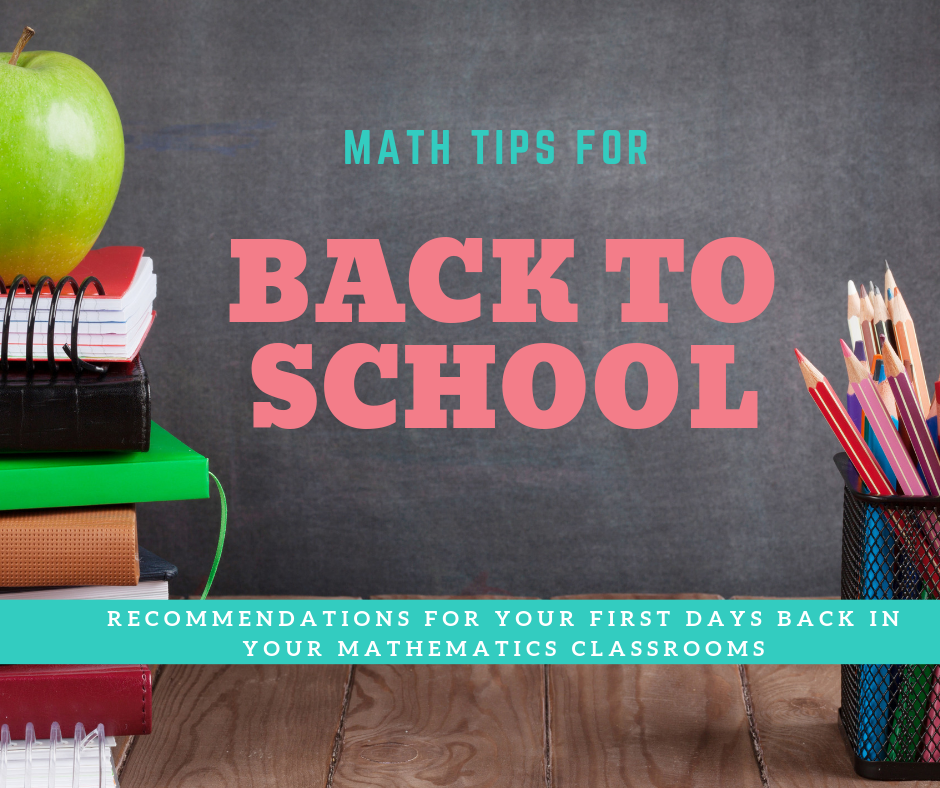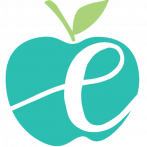
11 Aug Back to School Recommendations for Math Class
There isn’t anything quite like the beginning of the new school year. Although we are sad to see the summer leave, there is a certain excitement around new school years that is hard to match. In fact, my son had a second-grade teacher who came into teaching as a second career. She was in banking before teaching.
She used to say, “In what other profession do you get a chance to start with a clean slate each year, have an ‘official’ finish and time for reflection, set goals and achieve them within a year, etc??”
She had such a refreshing perspective on the joys of teaching. She loved the start and end of each school year.
As we enter a fresh new year, with new mathematicians, I thought I’d give you a few recommendations.
Work on the community. No like REALLY work on the community. The first ten days of math class should be about building up trust and a new ‘perspective’ on what math class will look and feel like this year. What you choose to do in these first ten days tell students an awful lot about what is important to you as a teacher. This DOES NOT MEAN avoid curriculum for 10 days, it means to use it to teach and send the right messages.
- Avoid pre-tests, timed tests, and the beginning of the year tests. At least the first few days of school. Or think about how you can do math games or collaborative activities that give you the same information but in a non-threatening way. Think about walking into a classroom on the first day and your teacher gives you a test. If you know the answers– this is going to be a great year! Look how smart I am! If you don’t know the correct answers– “Oh no, see I knew I wasn’t good at math. I’m not good at it again this year and now my teacher knows that.” No matter how you try to paint it, assessments (especially pre-tests that are basically designed to tell us that kids don’t yet know what they have yet to be taught) can really negatively impact a positive math culture. I know, you probably tell them it’s ok, just do your best, skip what you don’t know, etc. But, really, friends, put yourselves in their place. If you were taking that assesment, would you believe those statements from someone you JUST met? There is no trust yet. They don’t know what you value and don’t value. I beg of you, please wait until you’ve built some community and you’ve proven to students it’s ok to make errors, it’s ok to not know, and that you truly CARE about them as mathematicians and believe they are very capable of high-level mathematics.
- Begin routines and structures right away. You can start teaching lessons day 1– but use your first few lessons to teach how math will run this year. Think about supplies, access to math tools, etc. Design your lessons to prove to students what you VALUE and then practice, practice, practice. Use student leaders Day 1, and begin training students that you believe they are the leaders and teachers of the classroom.
- Focus on the qualities of a mathematician, and not on correct answers. Build an anchor chart as you go through the first few weeks of school. Mathematicians…. And then chart the things you catch students doing during math. “Mathematicians take risks! Did you just see John raise his hand even though he wasn’t confident of his answers? Let’s put that on our chart….” If students think you only care about the right answer and the teacher’s way, they will very quickly find a coping mechanism to avoid doing math work. If they feel defeated before they start, they might as well not start.
- Don’t make math about a workbook. Step away from the workbooks. Practice using them, but don’t make them the center. Consider Jo Boaler’s inspirational week of math activities. THESE are fabulous for building a growth mindset and teaching kids math is so much more than a workbook.
- Teach protocols for EVERYTHING. See my list for ideas on what should be taught. If you aren’t getting the results that you want– students aren’t taking care of supplies, their notebooks are a disaster, they aren’t trying, etc. that has everything to do with how they were trained. Anything worth doing is worth doing well.
At the beginning of each year, students are wondering…
Will this year be like last year? Am I still bad at math? Am I still the smartest because I always know the answer quickly?
What does this teacher value?
Correct answers?
Fast work?
No talking?
Or does she value collaboration, effort, multiple methods, talking, understanding my ideas?
Can I use math tools to help me learn or does she want me to do it in my head?
What if I don’t know? Will I get in trouble if I look to see what my neighbor is doing?
If I give the wrong answer, will she acknowledge my thinking or will she shut me down by moving onto the next answer?
These are only a few of the questions I know students are asking themselves at the start of each new school year. If you want to change the reputations or mindsets of certain students, it starts and ends with YOU and how we set up our classrooms those first few days. We will either validate and confirm, or we will reconstruct those mindsets.
So, when you are building community, it’s about being explicit about the things YOU VALUE in your math classroom.
Do you value mistakes or do you just give them lip service? You talk about a growth mindset, but when anyone makes a mistake we quickly move on, pull them into a group, or publicly correct them. Or, do you acknowledge the error and make it a part of the learning? “Tell me more…” Is a great sentence stem that tells students you are more interested in understanding their answer than correcting it. This will lead to many more moments of risk-taking. What if kids were only allowed to use pen in your math classroom? That’s what I did in mine. I wanted to send the message that I was interested in ALL of their thinking, not just the final right answer. I wanted to see when they changed their mind, their rough draft thinking, and how their ideas morphed into their final answers. Erasing seemed to send the message of shame. I wanted to send a different message.
Do you value being fast and getting the right answers? Do you give fact fluency tests and time them? This sends the message that math facts, fast, is most important. Or, do you start the year with number talks so that students know and understand being able to explain your thinking, break down your ideas, and work flexibly with numbers is most important? There is a time and a place to assess automaticity with facts– my argument is that the time is NOT the first few weeks of school. I know I don’t need a timed test to quickly know which students struggle with facts. I can learn that information through number talks, as well, which is WAY less intimidating and anxiety-producing.
Do you value silence, and eyes on your own work? Or do you value collaboration, orienting to each other’s thinking, agreeing/disagreeing, explaining other’s work, etc.? When we don’t know the answers, do we feel ashamed? Or do we feel the freedom to try something even if it is the same ‘something’ our neighbor is trying? I don’t think that is copying. That’s called collaboration. Watch a room of adults do a task independently. Guaranteed more than 50% will be looking secretively at their neighbor’s work trying to affirm they are right, have the right start, etc. We all want affirmation and desire collaboration. If I want to know what a specific student thinks and feels, I’m going to ASK THEM. conferring with students during these moments tells me WAY more than a single piece of paper.
Do you value math tools and resources? Am I allowed to get them when I need them? Are they in places where I’ll be embarrassed to get them? Are they easily accessible? Is it a ‘norm’ that kids use math tools? What lessons can you design the first week where tools are necessary so that you can make explicit teaching points about using them and getting them?
This list is a good start. What else would you add? What questions does this lead you with? I would sure love to hear your thoughts. Help me continue the conversation by leaving a comment or engaging in dialogue online.
Get your Routines Checklist Below


Leslie Wall
Posted at 03:30h, 14 AugustI’d love a copy of routines checklist! Thanks Shannon!
MaryBeth Batie
Posted at 17:16h, 15 AugustThis is very insightful!
Nancy Wittman-Beltz
Posted at 11:18h, 19 AugustCan’t wait to have a copy of the routines checklist! Awesome